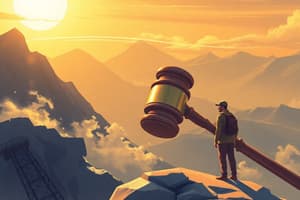Podcast
Questions and Answers
Which of the following is the most accurate definition of a citizen?
Which of the following is the most accurate definition of a citizen?
- A member of a nation, either by birth or naturalization, who owes allegiance to the government and receives certain rights and protections. (correct)
- A person temporarily residing in a country for employment.
- A person born in a territory possessed by a nation, owing allegiance but lacking certain rights.
- An individual who has been granted permission to enter a country for a specific purpose, such as education.
What is the primary distinction between an 'immigrant' and a 'non-immigrant' according to the material?
What is the primary distinction between an 'immigrant' and a 'non-immigrant' according to the material?
- Immigrants are seeking temporary residence while non-immigrants seek permanent residence.
- Immigrants are granted permission to enter the country, while non-immigrants are undocumented.
- Immigrants are seeking permanent residence while non-immigrants are here for a specific purpose like a job or education. (correct)
- Immigrants must carry documentation at all times, while non-immigrants do not have this requirement.
Under what circumstance is a person born outside of the United States to US citizens considered a citizen?
Under what circumstance is a person born outside of the United States to US citizens considered a citizen?
- If certain criteria are met, possibly resulting in dual citizenship. (correct)
- If they are born on a military base.
- If they are adopted by US citizens, regardless of criteria.
- If their parents are foreign diplomats living in the US.
According to the content, which amendment defines citizenship in the United States?
According to the content, which amendment defines citizenship in the United States?
What is the general term for the process if someone does not meet the standard requirements to become a citizen?
What is the general term for the process if someone does not meet the standard requirements to become a citizen?
What was one of the Early US requirements to be a citizen?
What was one of the Early US requirements to be a citizen?
What is a key component of 'Culture'?
What is a key component of 'Culture'?
What concept promotes diversity?
What concept promotes diversity?
Which group was the first to inhabit North America?
Which group was the first to inhabit North America?
Which of the following describes a key aspect of the 'Mass Migration' period (1880-1920)?
Which of the following describes a key aspect of the 'Mass Migration' period (1880-1920)?
What was the purpose of the Chinese Exclusion Act of 1882?
What was the purpose of the Chinese Exclusion Act of 1882?
What did the Hart-Celler Act in 1965 accomplish?
What did the Hart-Celler Act in 1965 accomplish?
Which of the following accurately describes the difference between 'Duties' and 'Responsibilities' of a citizen?
Which of the following accurately describes the difference between 'Duties' and 'Responsibilities' of a citizen?
Why do young men sign up for selective service?
Why do young men sign up for selective service?
What is a key aspect of 'Justice duties'?
What is a key aspect of 'Justice duties'?
What constitutes 'civil disobedience'?
What constitutes 'civil disobedience'?
Which of the following best describes what it means to be an 'informed citizen'?
Which of the following best describes what it means to be an 'informed citizen'?
What is the most important right and responsibility of a citizen?
What is the most important right and responsibility of a citizen?
What is a key attribute of being an 'active citizen'?
What is a key attribute of being an 'active citizen'?
Which of the following would be the example of 'Supporting your Community'?
Which of the following would be the example of 'Supporting your Community'?
Flashcards
Citizen
Citizen
A member of a nation, either born there or naturalized, owing allegiance to the government in return for rights and protections.
Noncitizen national
Noncitizen national
Born in territories held by a nation. They owe allegiance but lack certain rights.
Alien
Alien
Born in a nation different from where they live. They have not acquired citizenship, and lack certain rights.
Immigrant
Immigrant
Signup and view all the flashcards
Non-immigrant
Non-immigrant
Signup and view all the flashcards
Legal Alien
Legal Alien
Signup and view all the flashcards
Illegal Alien
Illegal Alien
Signup and view all the flashcards
14th Amendment
14th Amendment
Signup and view all the flashcards
Naturalization process
Naturalization process
Signup and view all the flashcards
Culture
Culture
Signup and view all the flashcards
Cultural diversity
Cultural diversity
Signup and view all the flashcards
Multiculturalism
Multiculturalism
Signup and view all the flashcards
Native Americans
Native Americans
Signup and view all the flashcards
Early European Settlement
Early European Settlement
Signup and view all the flashcards
Tracing Early Immigration
Tracing Early Immigration
Signup and view all the flashcards
Chinese Exclusion Act of 1882
Chinese Exclusion Act of 1882
Signup and view all the flashcards
Duties
Duties
Signup and view all the flashcards
Duties owed to the country
Duties owed to the country
Signup and view all the flashcards
Responsibilities
Responsibilities
Signup and view all the flashcards
Civil disobedience
Civil disobedience
Signup and view all the flashcards
Study Notes
What is a Citizen?
- A citizen is a member of a nation, either by birth or naturalization, who owes allegiance to the government and receives rights and protections.
- An immigrant is a person seeking permanent residence in a country.
- A non-immigrant is a person in a country for a specific purpose, such as a job or education.
- Legal aliens are given permission to enter a country for schooling, employment, family reasons, or as refugees and must carry documentation.
- Illegal aliens do not have permission to be in a country and may be seeking employment or a better life, and face many challenges without documentation.
- A noncitizen national is born in territories possessed by a nation, owes allegiance to the government, but lacks certain rights (e.g., American Samoa).
- An alien is born in or belongs to a nation different from where they currently live and has not acquired citizenship, lacking the same rights as citizens (cannot vote, serve on a jury, or run for public office).
Requirements To Be A Citizen
- Requirements for citizenship vary among countries, with some having minimal requirements and others very difficult ones.
- Early US requirements were limited to white, male landowners.
- The 14th Amendment grants citizenship to all persons born or naturalized in the United States and residing in a particular state.
- One is a US citizen if born on US soil, even if parents are not citizens.
- Adoption by US citizens can lead to citizenship if certain criteria are met.
- Being born on a military base in a foreign country confers US citizenship.
- Having US citizen parents, even when born outside the US, may allow for dual citizenship.
- An individual is not a US citizen if born to a foreign diplomat living in the US.
- Becoming a US citizen is possible if one's parents become citizens while the individual is under 21.
- Individuals who do not meet the standard requirements must go through the naturalization process.
- The requirements for naturalization include being at least 18 years old, legally admitted to the US, residing in the US for 5+ years, having good moral character, loyalty to the US, ability to read, write, speak, and understand basic English, knowledge and understanding of the US, and willingness to take an oath of allegiance.
The American Citizen
- Culture encompasses a society's beliefs, customs, traditions, and values.
- Cultural diversity refers to differences in race, ethnicity, gender, economic status, age, physical abilities, and beliefs.
- Multiculturalism is a philosophy promoting cultural diversity.
- The American population consists of many races and ethnicities, increasing diversity over time.
- Tolerance means having a fair, objective, and understanding view of those whose opinions, culture, race, religion, or nationality differ from one's own.
- Appreciation entails finding the quality in something and acknowledging its proper value.
The Evolution of Immigration
- Native Americans were the first inhabitants of the North American continent and were divided into hundreds of groups with unique cultures.
- Christopher Columbus and his crew were the first Europeans to settle in America.
- The first and longest stretch of immigration to America happened between 1600-1820 with the English, Spanish, and French; African American slavery marked this period as horrible.
- European countries migrated to America for its natural resources, and many settlers migrated for vast opportunities (land, wealth, etc).
- Early immigration tracing indicates French mostly in Canada, English along the Atlantic coast, and Spanish in the Caribbean and southern Atlantic coast.
- Group migration happened between 1820-1880; 7-15 million immigrants fled to the US for factory jobs in the Northeast and agricultural opportunities in the Midwest leading to the emergence of ethnic regions.
- Mass migration events happened between 1880-1920, with new technology affecting transportation after the Civil War, approximately 3 million Jewish people migrated to the US, the majority worked in large factories. (Steel, coal, automotive, and textiles)
Issues and Legislation Around Immigration Today
- The Chinese Exclusion Act of 1882 was the first legislative act that restricted immigration based on race.
- The National Origins Act of 1921 and 1924 marked the first time limitations were set on the number of immigrants entering the United States.
- The Hart-Celler Act in 1965 removed the racial quota system and created guidelines on family relationships and skilled workers.
- The Immigration Act of 1990 allows 675,000 immigrants into the United States every year.
- Major contemporary issues in the United States include illegal immigration and border patrol, debated as a state or federal issue.
Citizen Duties and Responsibilities
- Duties are requirements to be fulfilled by individuals, with consequences for non-compliance.
- Responsibilities are obligations individuals should fulfill voluntarily.
- Legal duties involve obeying the law and being familiar with the legal and court processes; ignorance is not a defense.
- Educational duties involve learning important skills through basic education, critical thinking, problem-solving, taking responsibility, and becoming contributing citizens.
- Financial duties involve paying federal, state, and local taxes to fund government services and programs.
- Duties owed to the country involves protecting the Constitution and young men between 18 and 25 signing up for selective services for military drafting.
Refusal to Uphold Civic Duties
- Justice duties include serving on a jury, (must be 18, employers must allow service, excused for hardship), and serving as a witness.
- There are consequences for not performing your civic duties such as fines, imprisonment, or loss of rights.
- Civil disobedience means choosing to disobey a law because a citizen is morally opposed to it, and citizens are trying to correct a societal wrong through a non-violent protest.
Responsibilities of US Citizens
- Being an informed citizen involves taking an interest in current events, candidates, and topical issues by watching the news, listening to the radio, reading newspapers, using the internet, and attending court hearings.
- Voting is the most important right and responsibility, giving all citizens a voice to express wants and needs to elected officials and make decisions on who should lead.
- Participating in government includes running for office, joining political parties, organizations, and clubs, and expressing opinions to public officials.
- Respecting fellow Americans involves knowing your rights, duties, and responsibilities, having tolerance for diverse opinions, and respecting communities and property.
- Giving back includes being a part of your community, volunteering, being kind and helping neighbors, and starting programs and getting others involved.
Being an Active Citizen
- An active citizen is someone who participates in his or her community as a contributing member of society.
- Active citizenship promotes the democratic process by ensuring citizen voices are heard.
- It creates unity by sharing similar beliefs and values and pulling together during times of crisis or emergency.
- Active citizenship protects and strengthens communities by building the type of communities citizens want.
- It prepares leaders/heroes and makes a difference, helping for a greater good.
- Active citizenship builds a stronger future by teaching future generations how to be active citizens and completing projects that will benefit future generations.
Examples of Being an Active Citizen
- Active involvement in government means voting, supporting candidates, writing letters and emailing public officials, participating in petitions and protests, and running for public office.
- Supporting communities can be done by supporting local businesses like farmers' markets, acting as a culture ambassador, donating to local charities and organizations, community cleanup programs, neighborhood watch, and sharing talents.
- Volunteer in Schools to students (Coach, Read to younger students, Tutor peers, Start awareness programs, and campus cleanup)
- Volunteer in the Community (Senior citizen communities, help neighbors, animal shelter, homeless shelters, help veterans, and many more opportunities.
- Volunteering includes national and international concerns by supporting large causes and volunteering for larger organizations.
Organizations Promoting Active Citizenship
- AmeriCorps meets the needs of communities.
- Citizen Corps helps communities prepare for emergency situations.
- Take Pride in America and US Forest Service preserves state and national parks.
- Youth organizations get students across the country interested in volunteering.
- Organizations build homes, clean highways, support military veterans, and Special Olympics.
- Organizations help the homeless by providing soup kitchens, food banks, and donations.
- Organizations help children and adults with illnesses, financial donations, seek cures, and make dreams and wishes come true.
- UNICEF provides health care, education, and relief for children around the world.
- Peace Corps promotes peace and cultural understanding around the world.
- Red Cross provides assistance and protection during times of crises.
Studying That Suits You
Use AI to generate personalized quizzes and flashcards to suit your learning preferences.





